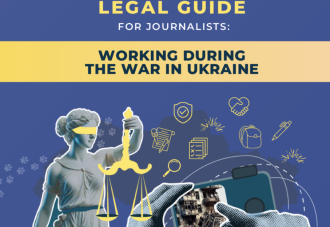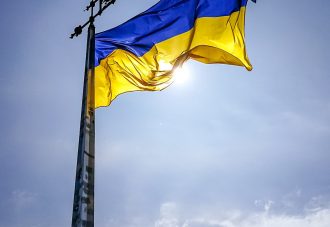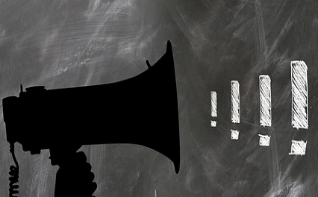From the civil society, media organisations and associations, and media outlets
of Eastern Europe, Caucasus, and Central Asia
On taking urgent and necessary measures to restore international law and order and overcome the consequences of the international security catastrophe caused by the armed aggression of the Russian Federation against Ukraine.
On February 24, 2022, the Russian Federation launched a large-scale invasion into sovereign and independent Ukraine in violation of the imperative norms of international law. This invasion was a continuation of Russia’s aggression against Ukraine that started in March 2014 with the annexation of Crimea and the subsequent occupation of part of the eastern territories of Ukraine. There is currently a large-scale international armed conflict in the heart of Europe, in which Russia is resorting to war crimes as a deliberately chosen strategy of terror against civilians. It is clear that this conflict has posed the greatest threat to world peace since World War II and could lead to the complete destruction of international law and order and the world’s entry into an era of “war of all against all.” This catastrophe became possible due to laziness, cowardice, and conformism of international institutions and organisations that have failed to effectively defend the principles of democracy, the rule of law, and human rights. It also became possible because by relying confidently on the international standards and norms developed after World War II, we did not pay attention to the fact that the all-encompassing technological “disruption” of recent years could require a substantial revision and/or adaptation of at least some of these standards.
Recognizing the high level of threat to the region and to the world while at the same time being confident that the greatest crises create unique opportunities for large-scale reforms and positive change, we call on the international community and competent international organisations to:
І. Demonstrate genuine commitment to the spirit of international law and the necessary political will to expel the Russian Federation from the UN Security Council. A country that has repeatedly violated the fundamental principles of the United Nations has no legal or moral right to be a permanent member of one of its key bodies.
ІІ. Recognize that the UN’s structure and certain operational procedures (above all, the rules of the work of the UN Security Council) were based on the political realities of the end of World War II and are neo-colonial and unjust by their nature. They have long been unable to uphold international law and order. For this reason, it is necessary to immediately begin the review process of the basic mechanisms of the UN with the aim of substantially reforming them to effectively ensure the preservation of peace.
ІІІ. Ensure that the Russian Federation is brought to justice for the international crimes committed against Ukraine, including the crime of aggression and war crimes. Should it be impossible to engage the International Criminal Court effectively, it is necessary to establish a special international tribunal to investigate and punish the crimes committed by Russian officials and military personnel against Ukraine.
IV. Given that Russia’s armed aggression against Ukraine incorporates a significant information component, the aforementioned international tribunal must consider holding liable a number of Russian media figures who deliberately, systematically, and massively developed and implemented aggressive information operations to spread disinformation, incitement to hatred, propaganda for and justification of Russian aggression against Ukraine. A provisional list of persons to be brought to justice is proposed in Annex 1 to this Statement. A non-exhaustive list of verified sources and reports with examples and evidence of such aggressive information operations is provided in Annex 2 to this Statement.
V. Recognize that freedom of expression and freedom of the media should in no way extend to aggressive information operations that are funded, controlled, and/or otherwise supported by countries with unlawful intent. Immediately begin the process of international consultations involving representatives of civil society, academia, and the media to develop a legal framework to limit and counter aggressive information operations at the global and regional levels. Numerous testimonies from Russian prisoners of war in Ukraine clearly demonstrate how aggressive information operations lead to actual armed conflicts. For the sake of protection of peace, this practice must be eradicated.
VI. Recognize that information aggression is not merely a supporting factor in modern conflicts but rather a powerful main component of them. Immediately begin the process of international consultations to develop an updated definition of aggression for the Rome Statute of the International Criminal Court to include aggressive information operations.
Being aware of the complexity of these demands, we are nevertheless convinced that their successful implementation is possible and necessary to preserve the civilizational achievements of humanity and overcome the global security crisis.
With respect and readiness to cooperate in achieving the objectives set out in this statement,
SIGNATURES:
- Independent Media Council, Ukraine
- Detector Media, Ukraine
- Institute of Mass Information, Ukraine
- Centre for Civil Liberties, Ukraine
- Internews Ukraine, Ukraine
- Regional Press Development Institute, Ukraine
- Suspilnist Foundation, Ukraine
- Centre for Democracy and Rule of Law, Ukraine
- Human Rights Centre ZMINA, Ukraine
- Commission on Journalistic Ethics, Ukraine
- StopFake, Ukraine
- Digital Security Lab, Ukraine
- Pylyp Orlyk Institute for Democracy, Ukraine
- Human Rights Platform, Ukraine
- Ukrainian Media and Communication Institute, Ukraine
- Consortium of the veteran organisation of the east, Ukraine
- Ukrainian association of media psychologist and media educators, Ukraine
- The National Union of Journalists of Ukraine, Ukraine
- Political psychologist association of Ukraine, Ukraine
- National media association, Ukraine
- European Values Center for Security Policy, Czech Republic
- Legal Media-Centre, Kazakhstan
- 101tv.kz, Kazakhstan
- Tilshi, Kazakhstan
- New Generation of Human Rights Defenders Coalition, Kazakhstan
- ProTenge, Kazakhstan
- Abzhan news, Kazakhstan
- MediaNet International Journalism Centre, Kazakhstan
- Factcheck.kz, Kazakhstan
- Youtube channel “Just journalism”, Kazakhstan
- Association of Independent Press (API), Moldova
- Centre for Investigative Journalism, Moldova
- Media–Guard Association, Мoldova
- Media Alternativa, TV8, Moldova
- Sud-Est Media AO (Moldova.org), Moldova
- Centrul PAS AO (Sanatateinfo.md), Moldova
- Jurnal TV, Moldova
- Committee for Freedom of the Press, Moldova
- A.O. „Media & Human Rights”, Moldova
- Independent Journalism Centre, Moldova
- Interact Media, Agora.md, Moldova
- Association of Electronic Press, Moldova
- NewsMaker.md, Moldova
- Belarusian Association of Journalists (BAJ), Belarus
- Solidarity Fund BYSOL, Belarus
- Georgian Alliance of Regional Broadcasters, Georgia
- Journalism Resource Centre, Georgia
- TOK TV-Georgia, Georgia
- Institute for Development of Freedom of Information (IDFI), Georgia
- Liberal Academy Tbilisi, Georgia
- The Greens Movement of Georgia, Georgia
- The Association of Business Consulting Organisations of Georgia, Georgia
- Imereti Union of Science – “SPECTRI”, Georgia
- Research-Intellectual Club “Dialogue of Generations”, Georgia
- Samtskhe-Javakheti Regional Association “Toleranti”, Georgia
- Georgian Trade Union Confederation, Georgia
- Association “Peaceful and Business Caucasus”, Georgia
- Association “Merkuri”, Georgia
- Black Sea Ecologist Union, Georgia
- Georgian Institute of Politics, Georgia
- Gori Information Centre, Georgia
- Energy Efficiency Foundation, Georgia
- Georgian Civil Development Association, Georgia
- New Generation For Democratic, Georgia
To join this statement, please fill out the form: https://forms.gle/JZGq5GUWN76LCLj48
Annex 1. Provisional list of persons to be held accountable for systematic, deliberate, and large-scale development and implementation of aggressive information operations to spread disinformation, incitement to hatred, propaganda, and justification of Russian aggression against Ukraine
- Dmitry Kiseliov, deputy director general at VGTRK
- Olga Skabeeva, host of a talk show “60 Minutes”
- Yevgeny Popov, host of a talk show “60 Minutes”
- Roman Balayan
- Zakhar Prilepin
- Anton Krasovsky
- Arkady Mamontov
- Margarita Simonyan
- Tigran Keosayan
- Vladimir Solovyov
- Alexey Nikolov, Managing Director RT
- Anton Anisimov, chief editor Sputnik
- Andrey Blagodyrenko, chief of ukraina.ru and Baltnews
- Dinara Toktosunova, Ruptly CEO
- Andrey Norkin, NTV
- Artyom Sheinin (Perviy Kanal)
- Anatoliy Kuzichev (Perviy Kanal)
- Olesya Loseva (Perviy Kanal)
- Irada Zeynalova (NTV)
- Roman Babayan (TV Center)
- Alexander Kots (Komsomolskaya Pravda)
- Andrey Kondrashov (VGTRK)
- Kirill Kleymyonov (Perviy Kanal)
- Arkady Mamontov(VGTRK)
- Dmitry Steshin (Komsomolskaya Pravda)
- Vladimir Kornilov (RIA)
- Vitaly Tretyakov (Higher school of TV, MGU)
- Oleg Lurie
- Nikolay Starikov
- Anna Shafran (Vesti FM)
- Andrey Ilnitsky
- Dmitry Kulikov (Perviy Kanal)
- Armen Gasparyan
- Oksana Boyko (RT)
- Inna Afinogenova(RT)
- Murad Gazdiev (RT)
- Igor Zhdanov (RT)
- Mikhail Rostovsky (RT)
- Maksim Sokolov (RT)
- Valentin Gorshenin (RT)
- Maksim Al Turi (RT)
- Xenia Fedorova (RT France)
- Maksim Dodonov (TV Zvezda)
- Maria Finoshina (RT)
Annex 2. Provisional list of verified sources and reports with examples and evidence of Russia’s aggressive information operations against Ukraine
1. Data base, monitoring and reports of EUvsDisinfo, the flagship project of the European External Action Service’s East StratCom Task Force (2015-2022) <https://euvsdisinfo.eu/disinformation-cases/?disinfo_keywords[]=77547&date=&per_page=>
2. #DisinfoChronicle.Kremlin disinformation about the military offensive in Ukraine, ongoing monitoring by Detector.Media as of 25 February 2022 and for the period of the international armed conflict <https://detector.media/propahanda_vplyvy/article/196936/2022-02-25-disinfochroniclekremlin-disinformation-about-the-military-offensive-in-ukraine/>
3. Ongoing monitoring and reports of StopFake initiative (2014-till present) <https://www.stopfake.org/en/category/research/>
4. Ongoing monitoring, reports and newsletters of the European Values Center for Security Policy <https://europeanvalues.cz/en/newsletters/>
5. European Commission, ‘A multi-dimensional approach to disinformation. Report of the independent High-Level Group on fake news and online disinformation’ (Luxembourg: Publications Office of the European Union, 2018) <https://sites.les.univr.it/cybercrime/wp-content/uploads/2017/08/Amulti-dimensionalapproachtodisinformation-ReportoftheindependentHighlevelGrouponfakenewsandonlinedisinformation.pdf>
6. NGO Internews Ukraine, Analytical publication ‘Words and Wars: Ukraine facing Kremlin propaganda’ (KIC 2017) <https://www.civic-synergy.org.ua/wp-content/uploads/2018/04/Words-and-Wars.-Ukraine-Facing-Kremlin-Propaganda.pdf>
7. de Jong S, Sweijs T, Kertysova K, Bos R, Inside the Kremlin House of Mirrors (The Hague Centre for Strategic Studies 2017) <https://issuu.com/disinfoportal/docs/inside_the_kremlin_house_of_mirrors>
8. Dutsyk D, Shutov R, Burkovskyi P, Chernenko S, Counteraction to Russian Information Aggression: Joint Action to Protect Democracy (Telekritika 2015) <https://issuu.com/marynadorosh/docs/telekritika_analytics_2015-engl_lig>
9. Janda J, Víchová V, Richter M, Sharibzhanov I, Fišer J, ‘How do the EU28 perceive and react to the threat of hostile influence and disinformation operations by the Russian Federation and its proxies?’ (European Values, 2017) <http://www.europeanvalues.net/vyzkum/overview-countermeasures-eu28-kremlins-subversion-operations/>
10. Kruk K, ‘Analyzing the Ground Zero. What Western Countries Can Learn from Ukrainian Experience of Combating Russian Disinformation’ (European Values, 2017) <http://www.europeanvalues.net/vyzkum/analyzing-ground-zero/>
11. Pomerantsev P, Weiss M, The Menace of Unreality: How the Kremlin Weaponizes Information, Culture and Money (The Institute of Modern Russia 2014) <https://imrussia.org/media/pdf/Research/Michael_Weiss_and_Peter_Pomerantsev__The_Menace_of_Unreality.pdf>
12. Splidsboel Hansen F, Russian Hybrid Warfare: A Study of Disinformation (DIIS 2017) <https://www.econstor.eu/bitstream/10419/197644/1/896622703.pdf>
13. Fact vs. Fiction: Russian Disinformation on Ukraine (Factsheet) (US Department of State, 2022) <https://www.state.gov/fact-vs-fiction-russian-disinformation-on-ukraine/>
14. Umland A, ‘The dangers of echoing Russian disinformation on Ukraine’ (Atlantic Council, 2021) <https://www.atlanticcouncil.org/blogs/ukrainealert/the-dangers-of-echoing-russian-disinformation-on-ukraine/>
15. Nicholson K, ‘There’s a flood of disinformation about Russia’s invasion of Ukraine. Here’s who’s sorting it out’ (CBC News, 2022) <https://www.cbc.ca/news/world/fact-checkers-ukraine-1.6365682>
16. Hybrid Warfare Analytical Group, ‘Fear, Lies, and Discredit. Overview of the Main Areas of Russian Disinformation in the First Half of 2021’ (Ukraine Crisis Media Center, 2021) <https://uacrisis.org/en/fear-lies-and-discredit-overview-of-the-main-areas-of-russian-disinformation-in-the-first-half-of-2021>
17. Moore C, ‘Russian and Disinformation: the case of Ukraine’ (CREST, 2019) <https://crestresearch.ac.uk/resources/russia-and-disinformation-the-case-of-ukraine-full-report/>
18. Holroyd M, ‘Debunking the most viral misinformation about Russia’s war in Ukraine’ (Euronews.com, 2022) <https://www.euronews.com/my-europe/2022/03/15/debunking-the-viral-misinformation-about-russia-s-war-in-ukraine-that-is-still-being-share>



